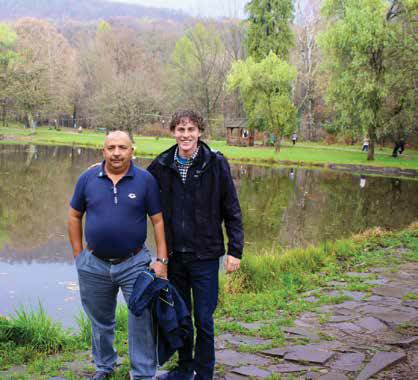|
A portion of your offering to ELCA Mission Support is used by the ELCA churchwide organization to support the livelihood of missionaries who coordinate the ELCA Young Adults in Global Mission country program throughout the world. |
Many residents of the Western Hemisphere aren’t familiar with the Roma, but this population (also known as gypsies) migrated from Northern India to Europe and is the largest ethnic minority group there. Throughout history they have been subjected to persecution, oppression and genocide.
Today they continue to face discrimination from the dominant cultures in Europe. For three years the ELCA has been working alongside the Evangelical Lutheran Church in Hungary to break down barriers between Roma and non-Roma. Young leaders from the ELCA Young Adults in Global Mission program help carry out this work.
Global Mission program help carry out this work.
One of the more serious social questions in Hungary is the relationship with the Roma and non-Roma population, said Bishop Tamás Fabiny of the Evangelical Lutheran Church in Hungary. “Roma live in very dire circumstances, where their everyday experience is poverty and hostile treatment from [the] majority of [the] population. The Hungarian Lutheran church is trying to do her best to help those in deep crisis.”
The young adult leaders connect with Roma people in a variety of ways, including ministries of the Evangelical Lutheran Church in Hungary, which is one of the ELCA’s global companion churches. Through their placements, young adults work with community projects, including education, afterschool activities, youth work and church-based programs.
Wherever they are, they are charged to make connections with Roma and non-Roma Hungarians, said Miriam Schmidt, an ELCA pastor and former country program director.
Thad Titze served in the program in 2013–14 and assisted with childhood education ministry in the Roma village of Görögszállás. The ministry, which took place in the children’s house, was connected to the local Filidelfia Lutheran Church in Nyirtelek. Serving preschoolers and their parents, the children’s house offered toys and activities to kick-start early childhood development and a warm meal each weekday.
“A lot of these children don’t have books and toys at home,” Titze said. “Coming to the children’s house … was also an opportunity to get warm. Many people didn’t have doors and windows.”
Because Titze lived just five minutes from the children’s house, he was often able to build deeper connections with his Roma neighbors who came there with their children.
“The deep brokenness and sadness in this community [prodded] at me every day,” Titze said. “I needed to accompany them in their brokenness and sadness. It was the hardest part of the year and the hardest thing to walk away with at the end of the year.”
Titze developed special relationships with his Roma host family and his supervisor Mihály “Misi” Györfi, who became both friend and spiritual adviser. Since he returned home to the U.S., he has kept in touch with his host brother, Little Sani, through Facebook, and new volunteers have come to serve in the village.
The relationships ELCA young adults are building with both Roma and non-Roma Hungarians continue beyond their year of service and through the young adults who serve after them. “They are a presence in [Hungary] who care about connecting in whatever way across all the language barriers,” Schmidt said.
“At the end of the day, the Young Adults in Global Mission program is about building relationships,” she added. “And that’s part of what our church is saying: There is something to be had in building relationships and finding a way to come together, and we do that in and through Christ. We find communion across all these differences that could keep us separate. That changes the communities that are here and the young adults who take part in this program.”
The Hungary program welcomes its fourth group of young volunteers in fall 2015.
Adapted from Stories of Faith in Action
© 2015 ELCA • ELCA.org • LivingLutheran.com



